 China's new-type guided missile frigate 'Bengbu' in live fire training
China's new-type guided missile frigate 'Bengbu' in live fire training
 China’s weekly story (2013.8.10 - 8.23)
China’s weekly story (2013.8.10 - 8.23)
 Flight team performs first show abroad
Flight team performs first show abroad
 With parents bedridden, 12-year-old boy becomes pillar of the family
With parents bedridden, 12-year-old boy becomes pillar of the family
 Top 10 private Chinese enterprises 2013
Top 10 private Chinese enterprises 2013
 The most gorgeous Chinese women in the eyes of foreigners
The most gorgeous Chinese women in the eyes of foreigners
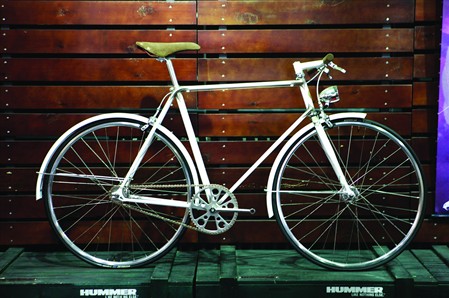 |
| A vintage bike. Photo: Li Hao/GT |
Who is buying?
Aside from extreme sport junkies who use professional cycling equipment and spend most of their weekends mountain biking around Beijing, pricey bikes are also targeted at all groups of consumers in the cities.
At the Alex Moulton flagship store in Guangqumennei Dajie in Dongcheng district, a customer with gray hair, surnamed Lu, is considering buying a bike for "around 50,000 yuan." Lu, who just retired from his job in an international trade company, is among the group of senior citizens who are well-off now that their children are independent, and looking for a relaxing way of doing aerobic exercise to keep healthy.
"For my age, the safety and comfort of riding take priority," said Lu, who plans to upgrade his bike for short touring journeys in Beijing's suburbs.
"The price is not a problem," he explains. "The bike for me will be worthwhile in two ways. One is for keeping fit, and the other is for collecting. That is why I pay particular attention to buying a hand-made European bicycle."
He is fascinated by the fact that the products by almost all the foreign high-end bicycle makers are now available in China. "When I had my first bike in the 1970s, I had no choice but a domestic Flying Pigeon or Forever," Lu recalls. "Everyone rode the same type of bike!"
High-school students in cities represent a sizable portion of high-end bike buyers. "Financed by their parents, high school students are often richer than their university counterparts and have more buying power. Many of them are riding the coolest, really expensive bikes," says Su Hao, a project director with the Farseekers, a Beijing-based organization specializing in promoting bicycle culture.
Companies are joining in on the act as well. "Many enterprises hope to build a healthy lifestyle for their employees," says Su. "There is even a Chinese mainland company which organized a tour that let their employees cycle along the route of the Tour de France."
"Meanwhile, buying pricey bikes as gifts or annual bonuses to employees is also very popular in recent years," he says.
"The conventional idea of sending alcohol, tobacco and food as gifts is being challenged by much healthier and environmentally friendly options," adds Yang, whose customers for Hummer bikes are also from big companies and governmental organizations.
Many middle-class consumers at a weekend cycling event in the suburbs would take an envious second look when a fashionable high-end bike is taken off the roof rack of an expensive automobile. Many nouveau riche are attracted to the bicycles so they can show off their uniqueness and good taste. For example, coffee shop owners sometimes buy a limited edition Gucci or vintage bike just to show off at their stores, says Yang.
Huang Hsu-chuan, the shop manger of the Alex Moulton store, comes from Taiwan. He says he hopes the high-end bike market in the Chinese mainland can develop gradually so as to avoid the "bicycle bubble" he witnessed on the island.
He says the mid-2000s saw a surge of pricey bike consumption fueled by the rising number of bike riders. "They were buying out the high-end bikes at stores," he recounts. "But after several years the market quickly shrank."
In Huang's opinion, "It is better if customers are sensible in choosing a bike that really suits them rather than just following a trend."


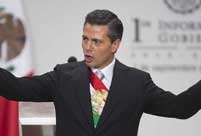 Mexican president delivers first State of Nation address
Mexican president delivers first State of Nation address Highlights of MAKS 2013 Int'l Aviation and Space Show
Highlights of MAKS 2013 Int'l Aviation and Space Show  10th China-ASEAN Expo opens in Nanning
10th China-ASEAN Expo opens in Nanning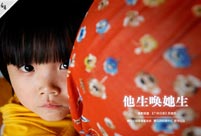 Baby born to save his sister - the story of a savior sibling
Baby born to save his sister - the story of a savior sibling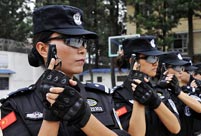 Lady of mystery: Female SWAT team in prison disclosed
Lady of mystery: Female SWAT team in prison disclosed 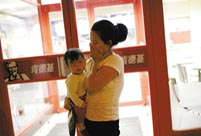 Single mother, baby live in KFC restaurant for months
Single mother, baby live in KFC restaurant for months Top 10 naked hotels in the world
Top 10 naked hotels in the world The most gorgeous Chinese women in the eyes of foreigners
The most gorgeous Chinese women in the eyes of foreigners A collection of bizarre rooftop buildings around China
A collection of bizarre rooftop buildings around China Putin intimate contacts with marine animals
Putin intimate contacts with marine animals China's frigate 'Bengbu'in fire training
China's frigate 'Bengbu'in fire training Fresh students 'forced' to register in university independently
Fresh students 'forced' to register in university independently 2013 Taiwan Int'l Tourism Expo kicks off in Taipei
2013 Taiwan Int'l Tourism Expo kicks off in Taipei Photo story: Take a gap year
Photo story: Take a gap year Nokia's Global Headquarters: visiting a declining empire
Nokia's Global Headquarters: visiting a declining empireDay|Week|Month